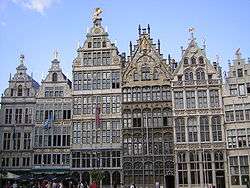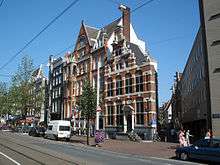Guildhall

A guildhall is either a town hall, or a building historically used by guilds for meetings and other purposes, in which sense it can also be spelled as "guild hall" and may also be called a "guild house". It is also the official or colloquial name for many of these specific buildings, many of which are now museums.
Brief history
A type of guild was known in Roman times. Known as collegium, collegia or corpus, these were organised groups of merchants who specialised in a particular craft and whose membership of the group was voluntary. One such example is the corpus naviculariorum, the college of long-distance shippers based at Rome's La Ostia port. The Roman guilds failed to survive the collapse of the Roman Empire. [1]
Merchant guilds were reinvented during Europe's Medieval period. In England, these guilds went by many different names including: fraternity, brotherhood, college, company, corporation, fellowship, livery or society, amongst other terms. In Europe, merchant guilds were known as natie, consulado, hansa. [2] A fraternity formed by the merchants of Tiel in Gelderland (present-day Netherlands) in 1020 is believed to be the first example of a Medieval guild. The first instance of usage of the term, "guild", was the gilda mercatoria used to describe a body of merchants operating out of St. Omer, France in the 11th century and London's Hanse was formed in the 12th century. [3] These guilds controlled the way that trade was conducted and codified rules governing the conditions of trade. Once established, merchant guild rules were often incorporated into the charters granted to market towns. By the 13th and 14th centuries, merchant guilds had acquired sufficient resources to erect guild halls in many major market towns. [4]
United Kingdom


In the United Kingdom, outwith Scotland, a guildhall is usually a town hall: in the vast majority of cases, the guildhalls have never served as the meeting place of any specific guild. A suggested etymology is from the Anglo Saxon "gild", or "payment"; the guildhall being where citizens came to pay their rates. For the Scottish municipal equivalent see Tolbooth.
List of guildhalls in the United Kingdom
- Bath Guildhall
- Blakeney Guildhall
- Boston Guildhall
- Cambridge Guildhall
- Chester Guildhall
- Chichester Guildhall
- Devonport Guildhall
- Derry Guildhall
- Exeter Guildhall
- Gloucester Guildhall
- Guildford Guildhall
- High Wycombe Guildhall
- Hull Guildhall
- Kingston upon Thames Guildhall
- Leicester Guildhall
- Lichfield Guildhall
- London Guildhall, headquarters of the City of London Corporation
- Londonderry Guildhall
- Middlesex Guildhall, Westminster, now home to the Supreme Court of the United Kingdom and the Judicial Committee of the Privy Council
- Much Wenlock Guildhall
- Newport Guildhall, a timber-framed building dating from 1540
- Northampton Guildhall
- Norwich Guildhall, built in 1410
- Oxford Guildhall (1292–1752), replaced by Oxford Town Hall
- Portsmouth Guildhall
- Rochester Guildhall
- Southampton Guildhall, City Hall and events venue in Southampton, Hampshire
- Shrewsbury Town Council.
- St Mary's Guildhall, Coventry
- Stratford-upon-Avon Guildhall, Stratford-upon-Avon, part of King Edward VI Grammar School and the building in which William Shakespeare is believed to have attended school.
- Swansea Guildhall
- Totnes Guildhall
- Windsor Guildhall, location of the wedding of Charles, Prince of Wales and Camilla, Duchess of Cornwall
- Worcester Guildhall, City Hall and events venue in Worcester, Worcestershire
- York Guildhall
Guildhalls in the Low Countries

The Low Countries used to have guildhalls in every city, often one gildenhuis (Dutch, literally "guild house") for each trade. They were often elaborate, ornate buildings, demonstrating the guild's status. Occasionally a single hall would be used by all the city's guilds.[5]
The guildhall was used as the offices of the deken (deacon) and other guild officers, and for meetings by the overlieden (board of directors). The guild members would occasionally be called to the guildhall for meetings on important matters.[6][7]
In Amsterdam, every guildhall had its gildeknecht (guild servant), often the guild's youngest member, and was guarded by a gildehond (guild dog). Every evening, the guild brothers gathered in the tavern room of the guildhall to discuss the events of the day while the gildeknecht served beer. Once a year, the guildmen would gather in the guildhall for a communal meal.[6]
The guildhall of the merchants' guild also served as de facto commodity market. Therefore, there was no need in the Middle Ages for a separate building for this purpose.[6]
In the Low Countries, each guildhall was marked by the coat of arms of that guild, hanging from the facade of the building. Occasionally, the coat of arms was replaced with a gable stone depicting a member of the guild, surrounded by the tools of his trade.[8]
In Belgium


- The Round Table (or Tafelrond, in Dutch) in Leuven. Designed 1479 by Matheus de Layens, guildhall built 1480-1487 internally comprising 3 houses, demolished 1817, reconstructed following original plans 1921. The old building's meeting rooms had been let to the guilds; the new had been in use by a bank and became a personal private property.[9][10]
- House The Salmon (or De Zalm, in Dutch) in Mechelen. Built ca. 1530 in early Renaissance style by architect Willem van Wechtere for the prosperous fishermen's guild, it is one of the city's finest historical houses. The artist Willem Geets (1839–1919) used to live there. In the mid-20th century it became city property and held a museum, then the Tourist Information Office, and later again a museum.[11]
See also
| Wikimedia Commons has media related to |
| Look up guildhall in Wiktionary, the free dictionary. |
References
- ↑ Epstein S.A, Wage Labor and Guilds in Medieval Europe, University of North Carolina Press, 1991, pp 10-49
- ↑ Gelderblom, O. and Grafe, E., "The Persistence and Decline of Merchant Guilds: Re-thinking the Comparative Study of Commercial Institutions in Pre-modern Europe," [Working Paper], Yale University, 2008
- ↑ Encyclopedia Britannica Online: https://www.britannica.com/topic/merchant-guild
- ↑ Epstein S.A, Wage Labor and Guilds in Medieval Europe, University of North Carolina Press, 1991, pp 50-100
- ↑ The Dutch term 'gildehuis', 'gildenhuis' on Dictionarist(TM) translated to English
- 1 2 3 Johannes Gouw, De gilden: eene bijdrage tot de geschiedenis van het volksleven. Portielje & Zoon, 1866, p.38 (Dutch)
- ↑ Otto van Rees, Geschiedenis der staathuishoudkunde in Nederland tot het einde der achttiende eeuw, Kemink, 1865, p. 121 (Dutch)
- ↑ Jacob Lennep & Johannes Gouw, De uithangteekens in verband met geschiedenis en volksleven beschouwd. Gebroeders Kraay, 1868, p. 137 (Dutch)
- ↑ "The round table (tafelrond)". Retrieved 20 July 2011.
- ↑ "Leuven architecture and sculptures (brochure)" (Pdf). City of Leuven (Tourism Leuven). Retrieved 20 July 2011.
- ↑ De Zalm: thuis voor de Besloten Hofjes (in Dutch)